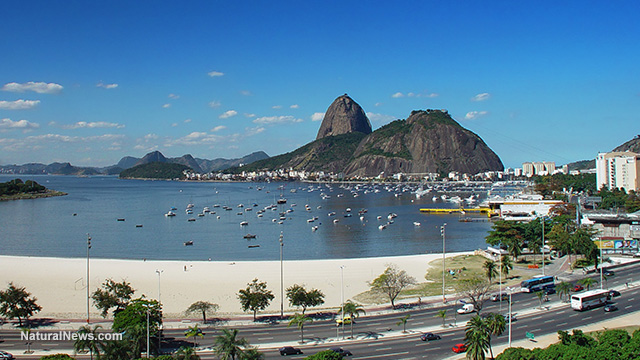Female Belgian sailor becomes first Olympic athlete to contract severe stomach infection after racing in Rio's sewage-filled waters
Saturday, August 13, 2016 by: Julie Wilson staff writer
Tags: olympics, bacterial infection, sewage

(NaturalNews) Belgian sailor Evi Van Acker is unlucky enough to have become the first athlete competing at the Olympic Games in Rio de Janeiro to be affected by the region's grossly contaminated waters, which are known to harbor raw sewage, garbage and even human body parts.
Acker's coach Wil Van Bladel told the media that the star sailor likely contracted a bacterium from the water during practice runs in July in Rio's polluted Guanabara Bay. The illness has now evolved into a full-blown gastrointestinal infection that could potentially prevent the athlete from earning a well-deserved medal.
"Her poor performances have put her at risk of missing out on a medal in the Laser Radial class," reports the Daily Mail. Acker won the bronze while competing at the 2012 Summer Olympics in London. But her stomach infection is making it much more difficult to perform as well this year.
Rio's polluted waters already affecting athletes' performances
"Evi caught a bacteria in early July that causes dysentery," said van Bladel. "Doctors say this can seriously disrupt energy levels for three months. It became clear yesterday that she lacked energy during tough conditions. She could not use full force for a top condition. ... The likelihood that she caught it here during contact with the water is very big."Acker was evaluated by medical staff following her races on Wednesday, and they confirmed that so far this seems to be an isolated case. However, it's highly probably that more athletes will fall ill.
The South Florida Times reported last month that Olympic athletes "risk becoming violently ill and unable to compete" in the games due to severe water pollution.
Water sampling detected exceedingly high levels of disease-causing viruses
Water sampling conducted by the Associated Press detected "dangerously high levels of viruses and bacteria" that entered the water through the dumping of raw sewage.Experts say that visitors to the region, including Olympic athletes, are far more at risk for infection than are natives, because they haven't developed immunity to the germs due to lack of exposure.
"Raw waste runs through open-air ditches to streams and rivers that feed the Olympic water sites. As a result, Olympic athletes are almost certain to come into contact with disease-causing viruses that in some tests measured up to 1.7 million times the level of what would be considered hazardous on a Southern California beach," the paper reported.
The gastrointestinal infection Acker contracted "makes it difficult for her to go through long periods of sustained effort," said her coach.
The infection results in inflammation of the stomach and intestines, causing an array of uncomfortable symptoms including vomiting, severe abdominal cramps and diarrhea.
The illness is normally contracted by ingesting food or water contaminated with bacteria, such as salmonella found in meat, dairy and egg products.
Antibiotic resistance most imminent threat to public health
The best way to beat a stomach infection is to drink lots of fluids and consume food and drinks with potassium and electrolytes, and of course, not to swallow sewage water.Arguably one of the greatest risks of competing in Rio's contaminated water is the risk of developing an antibiotic resistant infection.
Superbugs have become much more prevalent over the years due to environmentally destructive practices including factory farming, land application of biosolids, pollution in general and the over-prescription of antibiotics.
The World Health Organization concluded that antibiotic resistance is one of the world's greatest threats to public health. "It can affect anyone, of any age, in any country," it reports.
"A growing number of infections—such as pneumonia, tuberculosis, and gonorrhoea—are becoming harder to treat as the antibiotics used to treat them become less effective."
Sources:
DailyMail.co.uk
WHO.int
SFLTimes.com
Olympics at FETCH.news
Get independent news alerts on natural cures, food lab tests, cannabis medicine, science, robotics, drones, privacy and more.
Take Action: Support Natural News by linking to this article from your website
Permalink to this article:
Embed article link: (copy HTML code below):
Reprinting this article:
Non-commercial use OK, cite NaturalNews.com with clickable link.
Follow Natural News on Facebook, Twitter, Google Plus, and Pinterest
- Newly released JFK files reveal Pentagon's role in creating Lyme disease and covid in the same lab
- Discovery of vast underground city beneath Giza pyramids challenges human history
- Black cumin seed oil emerges as a powerful ally against breast cancer and chronic inflammation
- Kiss Your Genetic Privacy Good-Bye! 23andMe Gets Green Light to Sell Your Intimate Genetic Details to Anyone They Want
- Sugar-free deception: Artificial sweeteners hijack hunger signals, fuel obesity epidemic, study warns
- Catastrophic 7.7 earthquake devastates Myanmar and Thailand; death toll could reach 100,000
- AI breakthrough slashes celiac disease diagnosis time from months to minutes
- Europe braces for WAR as EU urges citizens to STOCKPILE FOOD, in latest provocations with Russia
- Aluminum pollution: A silent threat to human health
- Thomas Massie’s Dual Loyalty Disclosure Act aims to restore American sovereignty by cracking down on foreign influence in Congress
- Dr. Suzanne Humphries makes bombshell appearance on Joe Rogan podcast, exposing vaccine industry deception back to POLIOMYELITIS
- The cancer fear industry: How big pharma profits from panic-and what natural alternatives offer
- The mighty Eggplant: An underrated superfood with ancient roots
- 200 Tesla showrooms bracing for Saturday protests as movement against Musk escalates
- Is the vaccine-autism debate reopening? Washington Post sparks controversy with preemptive hit piece on David Geier
- Sweden's migrant crisis deepens as failed green energy venture leaves thousands jobless, exposes systemic collapse
- A handful of pecans a day could keep heart disease at bay, study finds
- Analysis: The coming economic collapse, a mass uprising and Trump's three secret weapons to halt the growing revolt
- Newly released JFK files reveal Pentagon's role in creating Lyme disease and covid in the same lab
- Analysis: The coming economic collapse, a mass uprising and Trump's three secret weapons to halt the growing revolt
- Trump nominates VACCINE ZEALOT Susan Monarez to lead the CDC, sidelining RFK Jr.'s reform efforts
- Trump's greatest betrayal so far: Accelerating Middle East wars, silencing dissent, and serving Zionist masters
- Dr. Mike Yeadon releases 15-minute testimony - WATCH - about genocidal intent of COVID “vaccines”
- Festive flavors: The sweet history, nutritional profile and health benefits of pecan pie
- Elon Musk: Aliens could be here on Earth RIGHT NOW
- Big Pharma's $8 Billion bribery scheme exposed: how doctors are pushed to prescribe junk science, not heal
- 5 Simple steps to boost your brainpower: How to strengthen executive function in a distracted world
- Trump reverses course on Gaza plan, says “nobody is expelling Palestinians”
- A lack of integrity in Academia: Harvard professor found GUILTY of fraudulent research to promote CRT theory
- Reclaim your health: How midlife exercise reverses years of inactivity
- Survival 101: Effective EMF blocking techniques
- Florida takes a stand: DeSantis proposes permanent ban on mRNA vaccine mandates
- Sugarcane extract superior to cholesterol-lowering drugs?
- California's social media censorship law struck down: A victory for free speech or a threat to online safety?
- OpenAI whistleblower who dissented against how the company trained ChatGPT found dead
- EPA advisor admits the agency is funneling billions to climate groups ahead of Trump’s return to White House
- EPA advisor admits the agency is funneling billions to climate groups ahead of Trump’s return to White House
- Newly released JFK files reveal Pentagon's role in creating Lyme disease and covid in the same lab
- California's social media censorship law struck down: A victory for free speech or a threat to online safety?
- Dr. Mike Yeadon releases 15-minute testimony - WATCH - about genocidal intent of COVID “vaccines”
- The Health Ranger releases “Vaccine Zombie” song and music video, using AI-animated zombies for the music video
- The pandemic as a tool for INDOCTRINATION: Understanding “The Indoctrinated Brain” by Dr. Michael Nehls
- Florida takes a stand: DeSantis proposes permanent ban on mRNA vaccine mandates
- “Why we influenced the 2020 elections”: Facebook files reveal the coordinated effort to bury the Hunter Biden laptop story
- Mike Adams releases country western hit single: Goin’ Back in Time is Comin’ Home
- Mike Adams releases music poetry sensation: A Child of God
- Unpacking the Lies That We’ve Been Fed – new song and music video released by Mike Adams, the Health Ranger
- Michigan sheriff announces criminal investigation into 2020 election crimes, Dominion Voting Systems
- Migrants are taking advantage of recent hurricanes to scam residents and loot their homes
- House Intelligence Committee calls for the ARREST and PROSECUTION of Dr. Anthony Fauci
- RFK Jr. clears key hurdle: Sen. Susan Collins backs controversial HHS nominee, signaling a new era for health policy
- Rep. Nancy Mace introduces bill to ban biological males from female facilities on federal property
- Peter Rost exposes Big Pharma corruption in his book “The Whistleblower: Confessions of a Healthcare Hitman”
- Mike Adams releases new song and music video: Nothing More Disgusting Than a Globalist
- Red Cross issues warning to stop blood plasma donations from vaccinated people
- Scientists confirm: GENIUS brain function can be spontaneously unleashed in humans without any apparent cause
- EPA advisor admits the agency is funneling billions to climate groups ahead of Trump’s return to White House
- HYSSOP: What research reveals about the health benefits of this ancient holy herb
- Two containers with completed ballots fall out of truck in Florida
- Fully vaccinated about to see “tsunami” of illness and death, warns virologist
- Global leaders unite to clamp down on “misinformation” with UN-backed Cascais Declaration
- BREAKING: 2025 NDAA authorizes mandatory military draft of WOMEN across America… as Pentagon pursues global NUCLEAR war with both Russia and China at the same time
- Michael Yon warns of a ZIONIST TAKEOVER in Trump’s second administration
- BOMBSHELL: DNA testing kits are a SCAM to develop ethnic-specific bioweapons
- Ozempic and Wegovy weight loss drugs are injectable LIZARD VENOM PEPTIDES that may unleash a devastating wave of organ failure… side effects align with symptoms of SNAKE BITES
- Israeli soldiers accused of even more torture and abuse in the West Bank
- These 13 countries just signed an agreement to engineer a global FAMINE by destroying food supply
- NASA admits that climate change occurs because of changes in Earth’s solar orbit, and NOT because of SUVs and fossil fuels
- RFK Jr. clears key hurdle: Sen. Susan Collins backs controversial HHS nominee, signaling a new era for health policy
- Sermon 30: How Jesus reveals Caesar’s FAKE CURRENCY and FALSE AUTHORITY
- Coriander seeds: Ancient medicine backed by modern science
- Arizona officials claim Maricopa County needs 10-13 days to tabulate results of the election
Science News & Studies
Medicine News and Information
Food News & Studies
Health News & Studies
Herbs News & Information
Pollution News & Studies
Cancer News & Studies
Climate News & Studies
Survival News & Information
Gear News & Information
News covering technology, stocks, hackers, and more



"Big Tech and mainstream media are constantly trying to silence the independent voices that dare to bring you the truth about toxic food ingredients, dangerous medications and the failed, fraudulent science of the profit-driven medical establishment.
Email is one of the best ways to make sure you stay informed, without the censorship of the tech giants (Google, Apple, Facebook, Twitter, YouTube, etc.). Stay informed and you'll even likely learn information that may help save your own life."
–The Health Ranger, Mike Adams












































